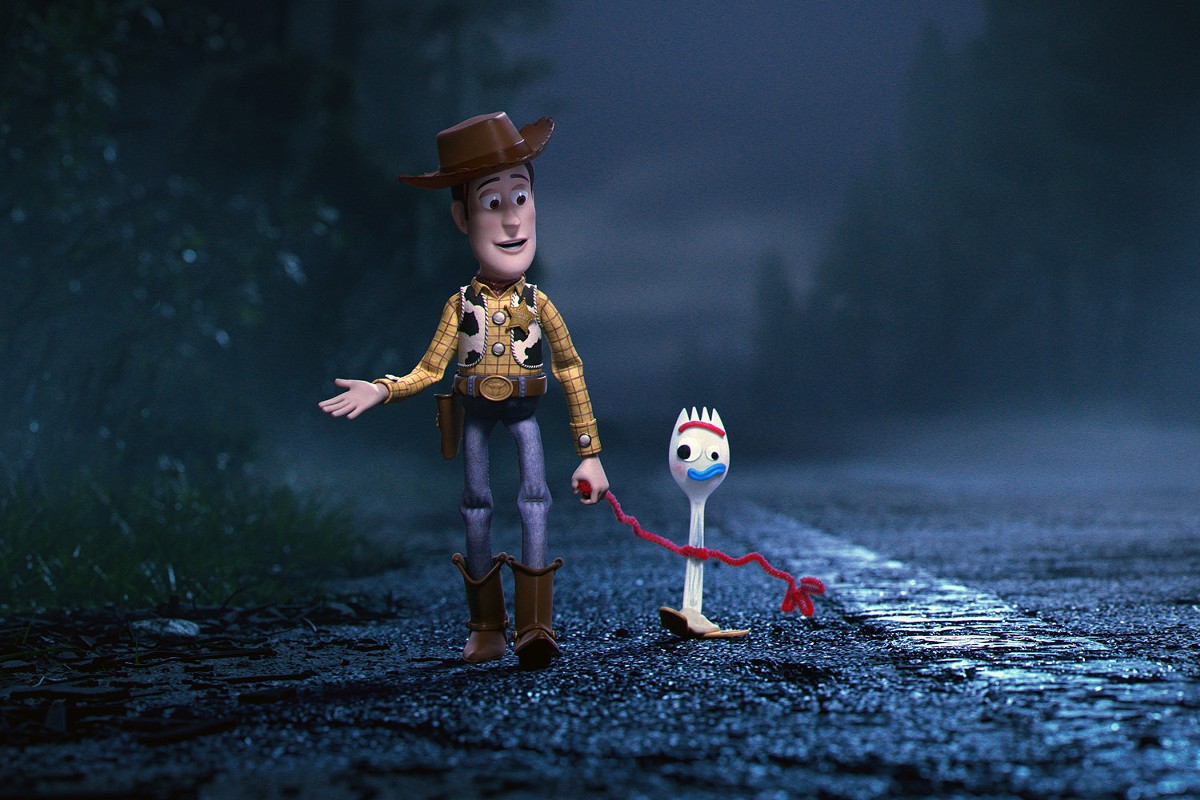The Toy Story movies have always interacted directly with the fundamentals of animation. As Pixar's prowess (for the company does feel like a single creature), the series' engagement with drawing, puppeteering, and overt artifice has gradually broadened — all the while the series' trappings have become less of a construct for delivering some idea than a world with its own rules, quirks, and textures. Dealing with elements ranging from body anxiety and insecurity to death to obsolescence with a clever conceit ("they're just toys"), and ranging in tone from erie to funny or sweet, there's a lot to be said for what Pixar's put together here over some 24 years.
This new one (we're now at number four) is no exception, getting tremendous mileage out of stunts, action setpieces, and battles in miniature, all within a blessedly fleeting hundred minutes. While broad physically and sharply written, it's focused well on its own minutiae, too; under Josh Cooley's direction it's pretty impeccable to look at: as well-lit as anything you might find and designed with some pretty exquisite attention to visual detail. Though not everyone will remark on the honed texture of the asphalt or carpet or the convincing depth of the fog in one of the film's best and most simple scenes — depicting a lengthy nighttime walk — anyone watching will feel the effects of how well Cooley's team has fleshed out the world.
Though artifice and communicative, personalized distortion play clear roles in animation, the film's world looks somehow softened and hyper-realized, cartooned and finely rendered — it's a strikingly close imitation of what we're used to but features strong flavors of its own. Though the movie's human characters, however, have odd, bulbous faces and recessed chins, it seems possible their uncanniness is deliberate, a way of reducing their expressive range or level of appeal for viewer identification relative to the film's smaller, vaster cast of characters. That all fits, because this movie is not about them in any significant way — though it may sound baroque for a kids movie, it's far more invested in the interactions, social structures, and hierarchies between the toys.
More than any other Toy Story, this one's focused closely on the interplay between the series' increasingly sweeping cast of toy characters. The threads that flow out from this are sprawling and tug the movie in many different directions — it's a productive and richly messy tension, even if it leaves a fair bit by the movie's end either rushed to close or unresolved. At Toy Story 4's center is a romance, this time between Bo Peep (Annie Potts) and Woody (voiced again by Tom Hanks), who is becoming anxious, even neurotic, about "his kid's" — Bonnie's — selective interest in many of her toys, including himself. At the same time, Bonnie makes a shabby toy at school with pipe-cleaners, Play-Doh, and a spork — one which comes to life wishing it hadn't, and repeatedly attempts to flee its station as her new favorite toy. The simple (in most all possible ways) Forky, as Bonnie calls him, makes "trash, trash" his mantra before hurling himself compulsively into that very grave. In doing so, he exacerbates Woody's protectionist, control-freak anxieties and serves as a foil for Woody's worries over becoming out of date and useless — leaving both Woody and Forky at odds with the other toys, who dismiss Forky as illegitimate, or junk. All the while Woody and Bo Peep are separated — for much of the movie he tries to find her, quietly court her, and re-establish a relationship established through montage at the movie's start.
There's also a kidnapping plot, a massive (but credibly fast) fight with a cat, a Canadian [toy, naturally] stuntman voiced by Keanu Reeves, and some genuinely, quite richly creepy moments revolving around a small-town antique store. I'd call this unwieldy movie overstuffed, but though it takes on more than it properly knows how to deal with by its finish, the way it teeters with superabundance keeps it densely packed, unpredictable, lively — and fun.
Accounting for much of the above is the reappearance of Little Bo Peep, a character the filmmakers work strenuously to rehabilitate here — and to great effect for most of the film. Formerly a kind of retro Princess Peach-type figure (an ongoing but elusive crush, who might give Woody a smooch if he does the right thing), she's here been recast as an independent figure, the cast-out leader of a troop of "lost toys," those toys who've been discarded and have no permanent owner. Gone is the flowery gown of the trophy-fied love interest — here now is a chic sleeveless jumpsuit, a cape, and a bo (ha) staff she uses with ready athleticism that befits her sly, sometimes finger-wagging line deliveries. Staking out a small carnival and playground as their home turf, her little band tries to help out other toys and kids (while also working for self-preservation) whenever such opportunities arise.
All the same, this newly independent status makes Bo Peep a lost toy — and so subject to the scrutiny and occasional condescension of not just the bekidded toy community, but Woody as well, who treasures with a sweet, sorry nostalgia the love between a toy and their kid. In other words, the two have traded their geographic separation for a tougher rift, a radically different set of priorities and lifestyles. When this difference erupts into what should be the film's richest conflict, the screenwriters wave it off shortly after, opting for a hasty, unconvincing resolution. In doing so, they undermine not just the independence they'd worked so strenuously to establish for their recast leading woman, but the heft of the movie's central conflict. The story bounds ahead to the next of its many turns.
That messiness and offhand quality is both what makes the world's movie so convincing — the fact it has tendrils that thread well past what we see offscreen is what makes its world so engaging. But it also muddies its politics, its (fairly unobtrusive) moralizing framework, its pacing at times, and its eventual conclusion. What we're left with is a movie rich in surprises, funny and sensitive at many a turn, and pretty terrifically produced. Even when it stumbles — in rendering toy hierarchies, toy society, toy romance, and toy psychology (really) — it shows us a thought-out and convincing world at just enough remove. Waffling between cartooning, reducing, and aptly capturing the world we live in with some approximation of its shagginess and loose ends, it's a movie that for the most part avoids Pixar's trademark patness. Even with its mix of issues and unresolved tensions, it's hard not to feel grateful the story is less immaculate than it looks.
Stay on top of Detroit news and views. Sign up for our weekly issue newsletter delivered each Wednesday.






